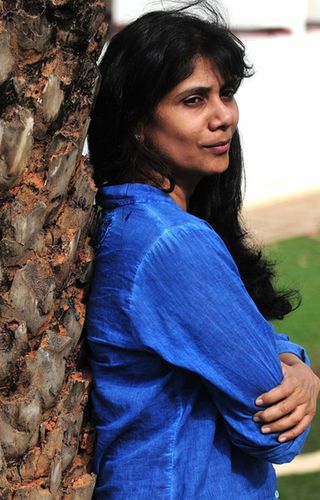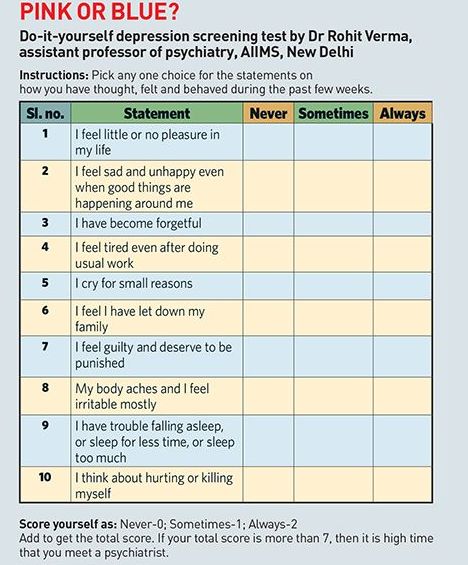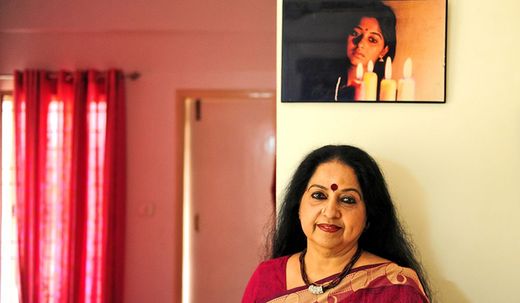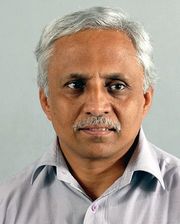“I remember pouring water for myself and letting the water just flow into the glass and on to the floor while the baby cried and cried. Then I had to literally shake myself and get out of the this-is-going-nowhere mood.’’
SHINIE ANTONY, who went on to write about mommy blues in her first collection of short stories Barefoot and Pregnant, suffered from postpartum depression after the birth of her first child. “When I came home with my newborn, it seemed to me that my life had effectively ended,” says Antony, who has edited several of author Chetan Bhagat’s books, including Half Girlfriend that released last year. “Suddenly all my decisions had someone else at the centre. Everyone cooed over the baby and then disappeared. My body, my lifestyle, my sense of being all entered an unknown territory. Sleep deprivation and this absolute responsibility for another being.... I was growing smaller and smaller and the baby was growing bigger and bigger.’’
Most working mothers go through spells of guilt when they leave a small baby at home, but Antony felt “a guilty pleasure’’ in the escape. “At work, I never mentioned I had a kid, never took a day off citing the baby, couldn't pretend to rue leaving it behind,” she says. “That moment when I ran out the door—to work or shop—the relief was indescribable. Without someplace to go to, motherhood would have left me a wreck. Looking back, it was a vague depression.’’
Antony, who had her first baby at age 30, was more prepared the second time round. “I did not expect things to be picture perfect,” she says. “I knew the baby would take time to become an individual, to go from blob to special. Plus, I had the pleasure of my firstborn's company this time round.’’
In retrospect, Antony feels that postpartum depression is not just a kind of moral weakness that would go away if ignored. “In the west, for a long time now, it is an acceptable health issue that can be treated with pills or counselling,” she says. “New moms need help, some more than others.’’
 Mom in distress: Shinie Antony suffered from postpartum depression after the birth of her first child | Bhanu Prakash Chandra
Mom in distress: Shinie Antony suffered from postpartum depression after the birth of her first child | Bhanu Prakash Chandra
Professor Michel Botbol, chief of department of child and adolescent psychiatry, Brest University Hospital in France, would agree with Antony. In his lecture at the Annual National Conference of Indian Psychiatric Society, held in Bengaluru, Botbol pointed out that postpartum depression is “an important problem of public health’’.
Depression in mother could affect her relationship with the baby and leave a negative impact on the child’s mental health. If the woman doesn’t make an effort to mend the psychological problems, it could have a negative impact on her marriage, too.
Women can develop postpartum depression one month to a year after childbirth. It is one of the most under-recognised and under-treated medical conditions. Hormones may play a key role in the genesis of postpartum depression. “The high levels of female hormones during pregnancy decline rapidly after childbirth. This sudden decline may be an important cause for postpartum depression,” says Dr Ambrish Mithal, chairman, endocrinology and diabetes, Medanta the Medicity. “There may be fluctuations in the mother’s thyroid hormone levels, which could be playing a role in postpartum depression. In addition, some studies indicate stress hormones released from the placenta during pregnancy [placental corticotropin-releasing hormone] may correlate with the development of depression after delivery.”
Recently, actor Deepika Padukone broke the silence over her battle against depression. She said she had felt “empty and directionless” despite being at the top of her career. Her revelations are, perhaps, just the tip of the iceberg. Modern-day women face tremendous stress, say experts. External stress is one of the major causes of depression in women. They suffer a lot because of socio-cultural norms, which put them at a disadvantage.
“Women are now doubly burdened. The demands on them keep increasing,” says Dr Sarada Menon, 92, India's first woman psychiatrist. “They find it hard to cope with the requirements of a nuclear family. Men just have to go to work. A lot of other burdens fall on women. As a result, they are doubly prone to depression than men.”
Studies indicate that women are 70 per cent more likely to suffer from depression than men. New treatments and therapies, however, offer hope. Even those with severe depression saw improvement with treatment. But due to the stigma attached to depression, women still hesitate to seek medical help, say experts.
“I feel terribly lonely. Despite doing all their duties, stay-at-home moms are ignored and devalued. They fall prey to depression.”
SEEMA KUMARI’S world revolves around her husband and children. A chemistry graduate, Kumari aspired to be a doctor. But she was forced to marry at a young age and thereafter she couldn’t continue her studies.
Her daughters, Aiswarya and Saundarya, have grown up. Both are staying in hostel and they hardly get to spend time with their mom except during holidays. Her husband, a banker, is busy with his work, which sometimes involves out-of-town trips.
At 44, Seema feels that she is all alone. “I get depressed due to loneliness,” she says. “Sometimes, I get worried about my health problems or family matters. But I have no one to talk to.”
 Looking for company: A homemaker, Seema Kumari says being alone makes her depressed | Salil Bera
Looking for company: A homemaker, Seema Kumari says being alone makes her depressed | Salil Bera
Children sometimes compare their stay-at-home moms with their friends’ moms, who look smarter and more stylish. “Such comparisons are painful and depressing,” says Kumari, who hails from Bihar.
Things are not easy for career women either. Even if they get a promotion at work they face criticism if their children don’t do well in exams. March often turns out to be the cruellest month for them.
So, what is the simplest way to deal with depression? Exercise every day, say experts. “Exercise is a very important part of the treatment,” says Menon. “Walk briskly for an hour a day in some clear area like a park, terrace or in your apartment complex. Exercise helps get rid of tension.”
Also, avoid sleeping during daytime. “Even if you are tired, walk around a little. Lying down will only make you feel more tired,” says Menon. “Keep yourself engaged in some way or the other. Maybe you can take rest for an hour in the afternoon.”
“A few days before my periods, I become a different person. I find a victim and pick fights with that person. At night, I cry out aloud like a mad woman.”
NIHARIKA GOEL of Gurgaon appears to be a sunshine girl. Her floral top seems to be an extension of her personality. She enlivens even the dullest of parties. But there are days when Goel undergoes a strange metamorphosis. She looks for reasons to sulk and cry. It can be as simple as a friend not picking up her call. “I yell at my husband and ignore my daughter,” she says. “Sometimes, I wake up at night and start crying and howling. A couple of times my daughter saw it and got really scared.” Goel, however, becomes normal once her periods start.
She is now on medication for premenstrual syndrome (PMS). “I’ve also started taking antidepressants and relaxants to sleep now,’’ she says.
Premenstrual syndrome is generally found in women between late 20s and early 40s. It refers to a group of symptoms occurring clinically 7 to 14 days before menstruation. “It is caused by changing hormones, chemical changes in the brain, low levels of vitamins, and excessive salt, alcohol and caffeine intake,” says Dr Laila Dave, consultant obstetrician and gynaecologist, Nova Specialty Surgery in Mumbai.

PMS cannot be diagnosed through lab tests, says Dave. Doctors generally rely on patient history and clinical findings. “The symptoms of PMS include tiredness, swollen tender breasts, bloating, food craving, inability to concentrate, depression (mild to severe), mood swings and irritability,” says Dave. “One can have premenstrual dysphoric disorder also, which is a severe form of premenstrual tension syndrome.”
PMS can sometimes cause complications due to depression, mood swings, lack of concentration and sleep disruption. “They can make one more vulnerable to suicidal tendencies if left untreated,” says Dave. It can be a hindrance to the working capability of a woman and cause problems in relationships. It can be treated through lifestyle modification, medication and alternate therapy.
“There are many yoga postures which may help individually, but an integrated yoga practice, including asana (postures), pranayama (regulation of breath), kriyas (cleansing), and deep relaxation such as yoga nidra, and meditation techniques will help manage symptoms of depression better,’’ says Vandana Nayar, yoga consultant at Bharat Thakur’s Artistic Yoga. “Some asanas which are found to be beneficial for people with depression are sarvangasana (shoulder stand), setu bandhasana (bridge pose), bhujangasana (cobra), supta vajrasana (supine thunderbolt pose), ushtrasana (camel pose), adho mukh svanasana (downward-facing dog pose). A daily practice of bhastrika pranayam, kapalbhati kriya, anulom vilom pranayam is strongly recommended along with kunjal kriya at least once a week.”
“Initially, I refused to accept that she was no more. At times, I would call her aloud.’’
SREEDEVI UNNI was heartbroken when she lost her daughter Monisha, a promising actor, in an accident. “It took me a lot of time to come to terms with the loss. The death left a huge vacuum in my life and I sank into depression,” says Unni, who would sometimes cry like a child. “That helped. I think people who have lost their dear ones should give vent to their emotions instead of bottling them up,” she says.
 It's all in the mind: Sreedevi Unni, who lost her daughter in an accident, overcame depression through positive thinking | Bhanu Prakash Chandra
It's all in the mind: Sreedevi Unni, who lost her daughter in an accident, overcame depression through positive thinking | Bhanu Prakash Chandra
Unni never took any medicines for depression. Instead, she overcame it with positive thinking. She derived strength from friends, family and spirituality. “One of my gurus treated me with Bhagavad Gita. It had answers to all my queries. Gita gave me a satisfying answer to my query ‘Why me?’,” says Unni, who practised Reiki, pranic healing, meditation and hypnotism, which helped her in the healing process.
Unni was in her early 40s when she lost her daughter. She believes that she wouldn’t have had the strength to bear the grief had she been older. “Recently, one of my relatives told me about a lady who has confined herself to a small room for the past 15 years after she lost her daughter and husband,” says Unni. “During a visit to Sarada Mutt in Bengaluru, I heard the sad story of a mother who lost all her four children. When I hear about such people I realise how lucky I’m. I, at least, have my son.”
Unni's dance academy, Monisha Arts, is the anchor of her life. “I forget all my sorrows when I’m with my students there,” she says. Yet, there are times when Unni misses her daughter terribly. Monisha was a chirpy and bubbly girl. To Unni, her belief in rebirth offers her a lot of solace.
The reaction to grief includes various stages like denial, anger, bargaining, depression and resolution, says Dr Koushik Sinha Deb, assistant professor, department of psychiatry, All India Institute of Medical Sciences, Delhi. Mental health experts can help the patient move through the various stages. “We help them come out of depression through therapy or medication, if required,” says Deb. “Once the resolution happens, we tell the patient to move on with the memories and lead a fruitful and meaningful life. For instance, if the daughter liked dancing, the mother can perhaps start a dance academy. We tell the mother that she should be happy for the time they spent together.’’
Expert view
Do Yoga To Lift Spirits
By Dr B.N. Gangadhar

Depression is among the most burdensome of mental illnesses. Psychosocial and biological factors predispose women for depression.
Traumatic events such as sexual assault account for higher prevalence of depression in women early in life. Social roles, too, are significant risk factors that explain higher rates of depression in women. Rapid fluctuation of ovarian hormones, increased cortisol (stress hormone) levels and postpartum period (up to six months after childbirth) are other common risk factors.
Symptoms like loss of appetite, sadness and hopelessness, and suicidal thoughts, are found more commonly in depressed women than men. The treatment poses differential challenges. In women, SSRI (specific serotonin reuptake inhibitor) has shown better results than tricyclic agents. Sex hormones, too, influence antidepressant drug metabolism in women, although it has little clinical effect.
Early detection and treatment are crucial in battling depression. Prematurely changing the dose or the drug itself is avoided unless disturbing side effects are seen.
Pregnancy and lactation, too, merit attention when treating depression in women. Though safe, reports caution rare lung consequences in the newborn if the mother uses antidepressants of the SSRI type. The risk of an untreated depression in pregnancy should be compared with that of such adverse consequence in an individual instance. Antidepressant drugs can safely be continued during breast-feeding. Though breast milk transfers the medicines to the infants, drug discontinuation is not recommended, given the risk of depression during the postpartum period.
In women with milder depressive illness, psychological approaches, including yoga, are preferred unless there is a positive history indicating that they need antidepressant drugs.
Patients with depression can learn the yoga postures over 2 to 4 weeks and continue with it for better results. Clinical research points to the antidepressant effects of yogasana and pranayama in optimal combination. Yoga lowers cortisol levels.
Formal/ structured psychological therapies include cognitive behaviour therapy. This entails sessions spaced out over weeks.
In more severe cases of depression, wherein the patient doesn't respond to the above-mentioned treatments, other approaches are being tested. These are broadly called brain stimulation therapies.
The oldest and time-tested one among them is electroconvulsive therapy. This is administered under short-acting anaesthesia over 6 to 8 sessions spaced out to twice or thrice a week. Though this is by far the most potent antidepressant treatment, other brain stimulations have also attracted attention.
Transcranial magnetic stimulation uses high intensity magnetic pulses applied over chosen areas on the head. Its advantage is that it does not need anaesthesia and hence is a safer outpatient procedure. Likewise, attempts have been made to apply low-intensity direct current over select areas on the head to obtain antidepressant effects.
More recently, a low-field magnetic stimulation was tested to see if it had an antidepressant effect. Both these low-intensity brain stimulation therapies showed promising results.
While free of side effects, their superiority over the older treatment is yet to be demonstrated.
Ketamine, an anaesthetic drug that acts via a different neurotransmitter system (glutamate), has shown to have antidepressant effects. Nutritional supplements (like vitamin B12), hormonal corrections (thyroid replacement), correcting menstrual irregularity (treating polycystic ovarian syndrome) and lifestyle modifications (weight reduction where needed, practising yoga or doing exercise, regular food and sleep habits) play a significant role in treating depression.
Gangadhar is professor of psychiatry at NIMHANS, Bengaluru.
New finding
An alternative to medication
A British study published in the journal The Lancet found that mindfulness-based cognitive therapy (MBCT) is as effective as antidepressants in preventing relapses in people who suffer from chronic depression.
It would be an effective alternative for people who don't want to be on long-term medication. It is as cost-effective, but without the side effects of medications.
For the study, 424 adults who were taking medication for depression were randomly assigned to either wean off their antidepressants and receive MBCT or continue with their medication.
The 212 patients, who were in the MBCT group and had eight group sessions of mindfulness therapy, were given instructions to practise it daily at home and also the option of four follow-up sessions over the year.
At the end of two years, relapse rates were similar in both groups—44 per cent in the therapy group and 47 per cent in the medication group.
MBCT combines mindfulness practices with cognitive therapy to help people recognise and replace negative thoughts and feelings with positive ones to prevent a downward spiral into depression.
“While the study doesn't show that mindfulness-based cognitive therapy works any better than maintenance antidepressant medication in reducing the rate of relapse in depression, we believe these results suggest a new choice for the millions of people with recurrent depression on repeat prescriptions,” said the study author.
It is believed that 4 out of 5 people with depression will relapse if they don't continue on some therapy.
That sinking feeling
Around 16 per cent people suffer from depression during their lifetime. It is twice as common in women as in men
49% women who suffer from postnatal depression do not seek professional help
38% women who suffer from depression during pregnancy have suicidal thoughts
One in eight women develops depression during her lifetime
It is most common in women in the age group of 25 to 44

CAUSES
* Depression is a complex illness arising out of an interaction between genetic and environmental factors.
* While a family history of depression increases an individual's vulnerability, unlike pure genetic diseases, the risk depends on a number of environmental influences.
* Hormonal factors also play a role. Post childbirth, 10 to 15 per cent of women experience postpartum depression.
* Stress hormone and thyroid abnormality also result in depression.
* Other important factors include abnormalities in brain function and imbalance in brain chemicals.
* Factors like negative life events (death or loss) and stress due to financial, work-related or personal factors also play a role, as do problems like social isolation and illnesses like cardiovascular disorders and cancer.
* Around 20 per cent people with drug abuse problems have major depression and anxiety.
EFFECT ON BODY AND MIND
* A person with depression lacks interest in activities, finds it difficult to concentrate, remember details and make decisions.
* A feeling of guilt, worthlessness, helplessness, pessimism and irritability is common.
* Loss of interest in activities once pleasurable, including sex, is common.
* Around 15 per cent people with depression have suicidal tendencies.
* Fatigue and lack of energy are the most common symptoms.
* Sleep disturbances with early morning wakefulness or excessive sleeping, overeating or appetite loss, persistent aches or pains and headaches are the other common symptoms.
* There is a reciprocal link between many ailments and depression. Obesity increases the risk of depression, which, in turn, is predictive of obesity.
* The presence of depression or poor response to treatment doubles the risk of death due to heart disease.
HOW TO DEAL WITH IT
* Medication and psychotherapy are effective methods of treatment.
* Techniques like interpersonal psychotherapy (improving interpersonal relationships) and cognitive behaviour psychotherapy (understanding the thoughts and feeling that influence behaviour) have shown results.
* Antidepressant medications are safe and effective in the treatment of depression. Around 2/3rd of patients recover with antidepressant medication.
* For patients who do not respond to the conventional form of treatment, there are other treatments like magnetic stimulation, electroconvulsive therapy and vagus nerve stimulation.
* Healthy lifestyle, physical exercise, good social interactions and family support help in preventing and treating depression.







